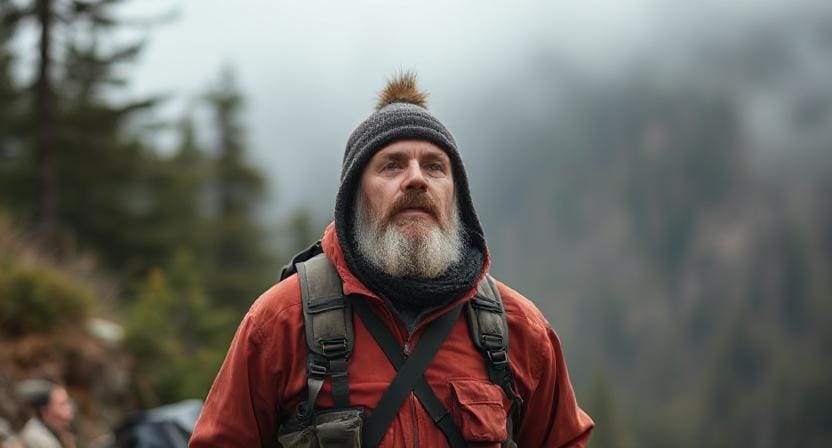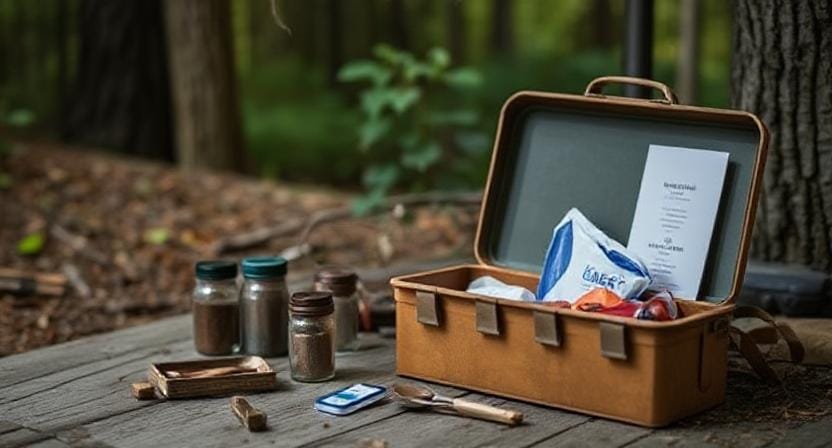Last Updated on November 2, 2025 by Kevin Collier

Top Takeaways and Key Concepts
– Cultivate a positive mindset to enhance problem-solving during survival challenges.
– Practice stress-reduction techniques like meditation or deep breathing to maintain calm.
– Set realistic goals to create a sense of purpose and direction.
– Build social connections for emotional support in difficult situations.
– Regularly assess your mental state and adjust coping strategies as needed.
When we think about how to stay alive, we usually only think about the basics: food, drink, and shelter. Oh, and how to light a fire without turning everything into a bonfire. You know, the normal things.
Please Note: This post may contain affiliate links. If you click one of them, we may receive a commission at no extra cost to you. As an Amazon Associate, I earn from qualifying purchases.
But what if you can't think of anything? When panic comes in, those talents don't matter much. It's like planning the finest picnic ever and then forgetting the blanket! So annoying, right?
That's where mental strength comes in. Think of it as a small set of tools in your head. This toolset helps you stay calm and adjust when things get rough. You know that feeling when everything seems too much? Resilience is like a safety net. It stops you from getting into a cycle of worry.
Imagine this: While you're camping, a squirrel claims it owns your food. You don't have to panic; you can laugh. You could even call the squirrel Sir Squeaks-a-Lot. That's mental strength in action! You change, stay calm, and find a way to keep your munchies safe.
It's good to practice this style of thinking. It's like working out your head. You could attempt mindfulness or breathing exercises. A few minutes can make a significant difference. It helps you think clearly when you need to.
Think of tough times as a puzzle. Your mental strength is the ability to put things together even when certain pieces are lacking. At first, it might seem like too much, but it gets easier with experience.
Being able to change is the key. Life throws things at us that we don't expect, like squirrels or rain out of nowhere. We can handle those times better when our thoughts are stronger. Being ready on the inside keeps us grounded.
When you think about how to stay alive, don't forget to include mental strength. Knowing how to find food or start a fire is crucial, but so is having a calm mind. You can handle anything that comes your way, even a demanding squirrel, if you have both of these things.
*** Shop for Survival Gear - Tools - Kits ***
Survival Gear - Bags and Backpacks - Knives - Boots/Footwear - Communication
Outdoor Cooking - Gloves - Hydration - Dry Boxes - Water Filtration Systems
Tents - Sleeping Bags - First Aid Kits - Multi-Tools - Flashlights - Fire Starters
Navigation - Survival Food - Night Vision - Headlamps - Stun Guns - Binoculars
What Is Mental Resilience Anyway?

So, what is this “mental resilience” that is so hard to find? Imagine you are a rubber band. You can feel like you're about to break when life gets too hard, as when you find out your hiking partner has eaten all the trail mix. But strong people can stretch without breaking; they bounce back from stress and problems with astonishing ease.
It's interesting that mental resilience isn't simply for people who want to survive or who like camping trips that go wrong. It also works in real life!
Being resilient can help you stay on your feet when you're stuck in traffic or send an awkward text to your boss instead of your best friend (believe me, I've been there).
Why is it Important To Be Mentally Strong In Survival Situations?

Imagine being lost in the woods and not being able to call for help (play scary music). You start to panic before you can even remark, “I should have packed more snacks.” This is when mental strength really stands out. It lets you look at your circumstance calmly instead of like someone who recently seen a bear in sunglasses.
People that are strong can focus on finding solutions instead of problems. They can think critically about their resources and make sensible choices depending on what they have. For example, they can use duct tape for everything (it really works!).
This skill can be the difference between finding safety and spending another night trying to figure out how to roast marshmallows over nothing but dry leaves in high-stress situations.
Making Your Mental Resilience Toolkit

Now that we know how important it is, how do we make this wonderful toolset for mental strength? First, be aware of your thoughts.
You may educate your mind to stay in the present when things get rough by paying attention to your thoughts and feelings without judging them. This includes times when you wonder why anyone thought camping was fun.
Changing negative ideas into positive ones is another fantastic way to deal with them. Instead of saying, “I'm lost,” say, “This is an adventure!” It seems trite, like something you'd hear at a lecture to get you motivated, but it works!
I remember a time when I got lost while trekking and ended up finding an amazing waterfall instead of freaking out over not knowing where I was.
Don't forget about social assistance, either! Having friends or family members who support you can help you stay mentally strong when things get tough. You know how certain friends always seem calm when things go tough? Spend more time with them; they're like life rafts for people!
Accepting Failure as a Part of Growth

Let's be honest: no one likes to fail, unless you're trying extremely hard not to laugh at someone who trips over their own shoelaces (and hey, it happens!). But accepting failure is an important part of becoming mentally strong.
Every setback teaches us something useful and helps us get stronger and smarter. For example, following last summer's disaster, I learned that I will never try to cook pasta over an open flame again.
When we fail at anything, like a camping trip that goes wrong or forgetting important supplies, we learn more about ourselves and what we can handle in the future.
So what should you do the next time things go wrong on an outdoor trip? Don't take anything too seriously! Who knows? You might get some funny stories along the road!
How Being Flexible Helps You Stay Alive
Speaking about being adaptable, that's another important part of building mental toughness! Plans change quickly, just like my dog can chase after squirrels (which is really fast). Being flexible implies being ready for change and knowing how to deal with it when it happens.
For example, if you set up camp and then rain clouds came out of nowhere (thanks weather app!), adapting means coming up with new ways to stay dry while still enjoying nature, even if it means huddling under tarps like wet cats waiting for help!
To become even more adaptable, make sure to venture outside your comfort zone on a regular basis. This could mean trying new things or taking different routes home from work every day. Believe me, these little changes will build up over time!
Conclusion: Cultivating Your Inner Survivor
It's like working out to build mental strength. You don't see those muscles grow overnight. You need to practice and give it time. But keep going, and soon you'll see a tremendous change!
Take a moment to think about it. How you react when things go wrong, as when your toast burns or the weather turns bad when you're camping, is important. Laughing at those times makes things seem less heavy. Seriously, who wouldn't want to giggle about the time they set their food on fire? Making fun of those mistakes is a lot more enjoyable.
Be positive! A little event, like a meal that burned, can make you feel bad and become a part of your tale. You could even turn it into a game. For example, “How burnt can my toast get before it becomes a total disaster?” That way, you can stay positive and maybe even make someone else at the breakfast table chuckle too.
When things go wrong, like camping in a storm that comes out of nowhere, it's helpful to be open-minded. That's fine if you need to make new arrangements fast. Keeping your cool and being flexible will help you stop worrying. It's like in those cartoons where someone stumbles on a banana peel and then gets back up, laughing.
Also, always bring extra food. Who really wants to cope with being hangry? Snacks make things better. They also give your brain energy while you think things out.
Keep in mind that every small problem is an opportunity to learn. You can make that resilience muscle stronger with time and practice. When things are rough, keeping a sense of humor can help you remember the good times. So enjoy the little things, pack your food, and have fun on the voyage. Life tosses a lot of curveballs, but if you're ready and grin, you can hit them out of the park!
Frequently Asked Questions
What does mental resilience mean in a survival situation?
Mental resilience is the ability to stay calm, adapt, and keep problem-solving under stress.
How does a positive mindset help during emergencies?
A positive mindset reduces panic and makes it easier to focus on realistic solutions.
Why is stress management important when surviving outdoors?
Controlling stress keeps your thinking clear, allowing better decision-making during critical moments.
Can meditation or breathing exercises actually make a difference?
Yes, short breathing sessions help regulate emotions and prevent fear from escalating.
How can setting small goals increase resilience?
Small goals create structure and direction, helping maintain motivation and momentum.
Do social connections matter in survival scenarios?
Yes, emotional support from others can boost confidence and reduce isolation under pressure.
Is flexibility a core part of mental resilience?
Being adaptable helps you adjust plans quickly when conditions change unexpectedly.
Suggested Resources:
Mental Resilience: A Guide
https://www.psychologytoday.com/us/basics/resilience/mental-resilience-guide
Building Mental Toughness
https://www.healthline.com/health/mental-toughness
How To Build Resilience
https://www.apa.org/topics/resilience

Kevin Collier is a seasoned survivalist and expert in prepping and homesteading, contributing to WiseSurvive.com. With a deep-rooted passion for self-sufficiency and outdoor survival skills, Kevin shares practical advice, strategies, and resources to help individuals prepare for any challenge. His informative articles cover a range of topics, from essential survival techniques to sustainable living practices, empowering readers to thrive in any situation. Whether you're a novice or a seasoned prepper, Kevin's insights will inspire you to take charge of your readiness and build resilience for the future.




